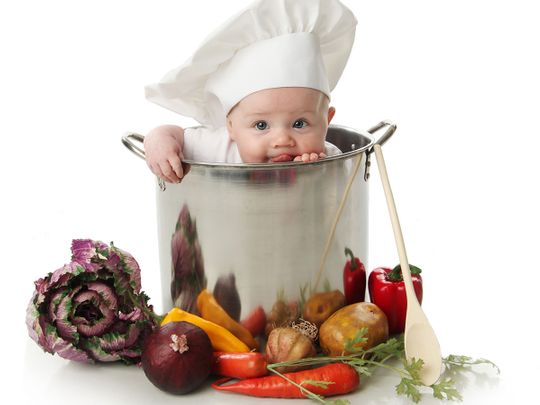
It’s like normal people – who would ordinarily never say such a thing in public – will lose all self-control and make cannibalistic statements when faced with this tiny version of species that gurgles, grins and spits up on them.
Bene Katabua, an Abu Dhabi-based Child and Educational Psychologist, says this comparison between baby and food is a cultural one. “In certain societies, they would gasp at the idea of speaking about babies in such a way,” she says.
In Bali for instance, children are considered divine and not fully human. Heather Paxson, professor of anthropology at Massachusetts Institute of Technology (MIT) and author of ‘Making Modern Mothers: Ethics and Family Planning in Urban Greece’, was quoted as saying in a New York Times article, “It’s very formal. Babies are seen as divine and not fully human.”

It is becoming increasingly normalised and we often see people commenting on how ‘delicious’ a baby is, etc.
“However,” says Katabua, “it is becoming increasingly normalised and we often see people commenting on how ‘delicious’ a baby is, etc.”
In the regions where babies – and foetuses – make a menu-able mark, it’s almost a metaphor. “We can think about ‘eating up a baby’ almost as a metaphor. You think about what babies often represent - comfort, safety, nurturance, etc. and it may be our way of representing a desire for that. Metaphorically desiring and ingesting that sense of safety, comfort, etc.,” explains Karabua.
Trained to do it
Of course, food comparisons have been helped along by family planning apps and books, and toppled into daily parlance as innocuous, cutesy nicknames. According to a New York Times article that quoted a representative for US-based BabyCenter, the pregnancy and parenting website, they launched the trend of comparing foetuses to produce in 1997. By 2008, the ‘What to Expect’ books had followed suit.
Plus, it makes for easy comparison – the fruits, vegetables and seeds provide a ready scale of reference for even the most spatial intelligence-challenged adult. “This has made it easy for mothers all over the world to track their baby's development, with fruits and veggies that are readily available and relatively easy to access,” says Karabua. These assessments begin early. In the eighth week of pregnancy, for instance, explains the BabyCenter website, the foetus is the size of a kidney bean.
All in the brain
Sneha John, Clinical Psychologist at Medcare Camali Mental Health Clinic, says it’s not just about finding an easy scale – it’s a more visceral response. “The baby smell lights up the same parts of the brain as other addictive things such as tasty food,” she explains.

There is research which shows that the smell of babies triggers certain reward circuits (dopamine) in mothers which are the same reward circuits as activated by food. The activation of the reward systems reinforces the motivation to act in a certain way.
And perhaps it’s a call to bond. Dr Ateeq Qureshi, Consultant Child and Adolescent Psychiatrist, Priory Wellbeing Centre, Dubai and Abu Dhabi, adds: “There is research which shows that the smell of babies triggers certain reward circuits (dopamine) in mothers which are the same reward circuits as activated by food. The activation of the reward systems reinforces the motivation to act in a certain way and this is thought to be an evolutionary mechanism to promote bonding – just like the strong bond with food.”
Balancing act
Or, it may be a sign of ‘cute aggression’, which is when adults who are ‘overwhelmed with very strong positive feelings’ when seeing baby pictures have aggressive responses. The term was coined by researchers at Yale University. “Your desire to pinch your baby's chubby cheeks is like crying tears of joy - the opposite emotions help to restore balance. It is a way to express the visceral emotion that was wrapped up in our obsession with the baby,” explains Dr John.
There is a case to be made for the parent who hops on a trend. In the year 2018, for instance, BabyCentre’s list explained that there’d been an uptick in the number of people who’d named their kids after fruit, vegetables – and in some cases, salad leaves. Arguably the one who kicked it all off was Hollywood actor Gwyneth Paltrow, who in 2004 decided to name her daughter Apple. But this nomenclature wave aside, for many it’s just a case of cute nicknames – think cookie, cupcake and sweetie.
At a recent family gathering, I met my four-month-old granddaughter for the first time – she was absolutely adorable. In a pink frilly frock and matching hat, she looked like a frosted cupcake. I just wanted to eat her right up.
Have a topic you'd like us to cover? Write to us at parenting@gulfnews.com








